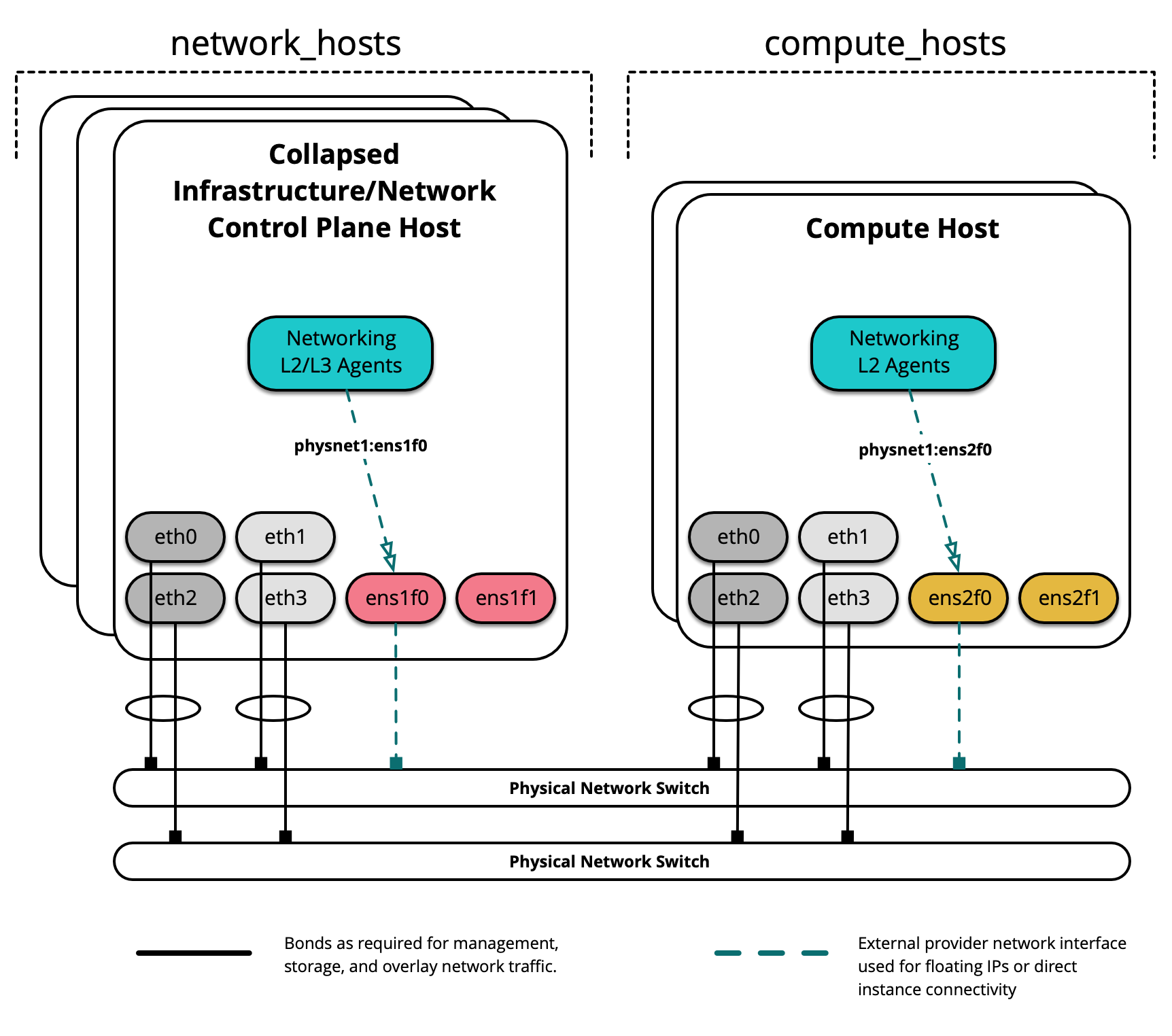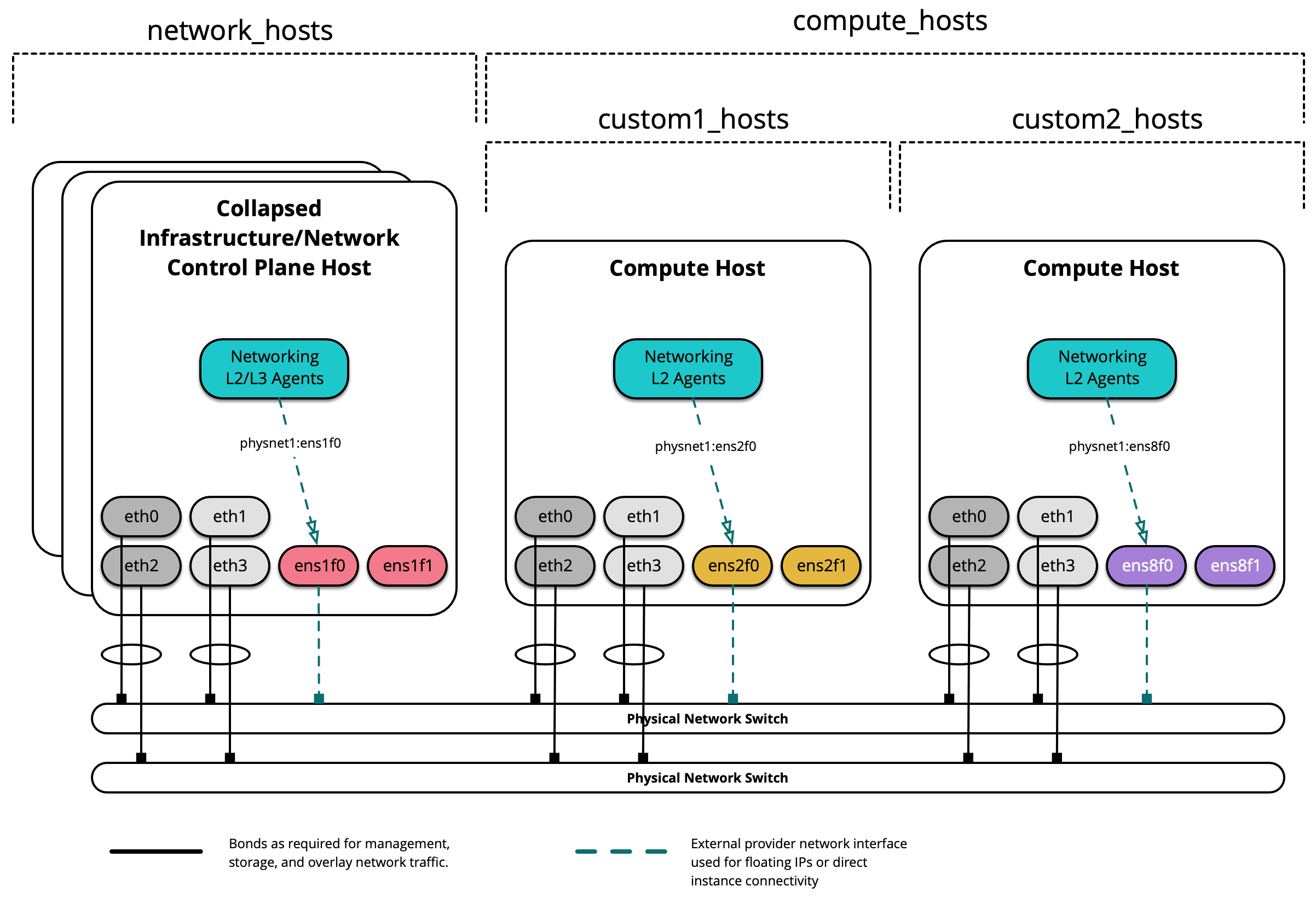5.1 KiB
Provider network groups
Many network configuration examples assume a homogenous environment, where each server is configured identically and consistent network interfaces and interface names can be assumed across all hosts.
Recent changes to OSA enables deployers to define provider networks
that apply to particular inventory groups and allows for a heterogeneous
network configuration within a cloud environment. New groups can be
created or existing inventory groups, such as network_hosts
or compute_hosts, can be used to ensure certain
configurations are applied only to hosts that meet the given
parameters.
Before reading this document, please review the following scenario:
- :dev_docs:Production environment <user/prod/example.html>
This example environment has the following characteristics:
- A
network_hostsgroup consisting of three collapsed infrastructure/network (control plane) hosts - A
compute_hostsgroup consisting of two compute hosts - Multiple Network Interface Cards (NIC) used as provider network interfaces that vary between hosts
Note
The groups network_hosts and compute_hosts
are pre-defined groups in an OpenStack-Ansible deployment.
The following diagram demonstates servers with different network interface names:

In this example environment, infrastructure/network nodes hosting
L2/L3/DHCP agents will utilize an interface named ens1f0
for the provider network physnet1. Compute nodes, on the
other hand, will utilize an interface named ens2f0 for the
same physnet1 provider network.
Note
Differences in network interface names may be the result of a difference in drivers and/or PCI slot locations.
Deployment configuration
Environment layout
The /etc/openstack_deploy/openstack_user_config.yml file
defines the environment layout.
The following configuration describes the layout for this environment.
../../../../etc/openstack_deploy/openstack_user_config.yml.provnet-group.example
Hosts in the network_hosts group will map
physnet1 to the ens1f0 interface, while hosts
in the compute_hosts group will map physnet1
to the ens2f0 interface. Additional provider mappings can
be established using the same format in a separate definition.
An additional provider interface definition named
physnet2 using different interfaces between hosts may
resemble the following:
- network:
container_bridge: "br-vlan2"
container_type: "veth"
container_interface: "eth13"
host_bind_override: "ens1f1"
type: "vlan"
range: "2000:2999"
net_name: "physnet2"
group_binds:
- network_hosts
- network:
container_bridge: "br-vlan2"
container_type: "veth"
host_bind_override: "ens2f1"
type: "vlan"
range: "2000:2999"
net_name: "physnet2"
group_binds:
- compute_hostsNote
The container_interface parameter is only necessary when
Neutron agents are run in containers, and can be excluded in many cases.
The container_bridge and container_type
parameters also relate to infrastructure containers, but should remain
defined for legacy purposes.
Custom Groups
Custom inventory groups can be created to assist in segmenting hosts beyond the built-in groups provided by OpenStack-Ansible.
Before creating custom groups, please review the following:
- :dev_docs:Configuring the inventory <reference/inventory/configure-inventory.html>
The following diagram demonstates how a custom group can be used to further segment hosts:

When creating a custom group, first create a skeleton in
/etc/openstack_deploy/env.d/. The following is an example
of an inventory skeleton for a group named custom2_hosts
that will consist of bare metal hosts, and has been created at
/etc/openstack_deploy/env.d/custom2_hosts.yml.
---
physical_skel:
custom2_containers:
belongs_to:
- all_containers
custom2_hosts:
belongs_to:
- hostsDefine the group and its members in a corresponding file in
/etc/openstack_deploy/conf.d/. The following is an example
of a group named custom2_hosts defined in
/etc/openstack_deploy/env.d/custom2_hosts.yml consisting of
a single member, compute2:
---
# custom example
custom2_hosts:
compute2:
ip: 172.29.236.17The custom group can then be specifed when creating a provider network, as shown here:
- network:
container_bridge: "br-vlan"
container_type: "veth"
host_bind_override: "ens8f1"
type: "vlan"
range: "101:200,301:400"
net_name: "physnet1"
group_binds:
- custom2_hosts